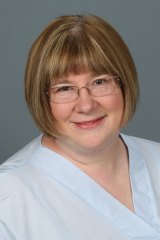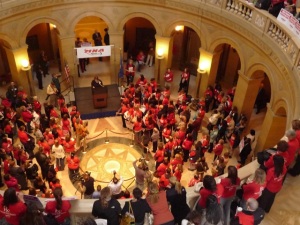 MNA President Linda Hamilton, RN, BSN joined health experts on Monday to highlight the impact of low-wage work on community health. The press conference also included Commissioner of Health Dr. Edward Ehlinger, Representative Tina Liebling and ISAIAH President Rev. Paul Slack and called for a wider discussion around ending poverty wages in Minnesota.
MNA President Linda Hamilton, RN, BSN joined health experts on Monday to highlight the impact of low-wage work on community health. The press conference also included Commissioner of Health Dr. Edward Ehlinger, Representative Tina Liebling and ISAIAH President Rev. Paul Slack and called for a wider discussion around ending poverty wages in Minnesota.
Although wages and health are rarely talked about together, the Minnesota Department of Health (MDH) drew the links. MDH released a report on Monday providing research to back up the claim that increases in income are associated with positive health outcomes.
The report states that people with higher income are more likely to live longer and healthier lives than those with lower income levels, and recommends policies aimed at increasing income for groups with the lowest income. The full paper can be found here.
President Hamilton’s remarks offer an honest and poignant bedside view of the issue.
Good morning,
My name is Linda Hamilton. I’m a nurse at the Neonatal Intensive Care Unit at Children’s Hospital, and I’ve been a nurse for 33 years. I’m also proud to serve as the president of the Minnesota Nurses Association.
Many families struggle with choices that create health. When person has to work 2 jobs to just pay rent and their most basic needs their choices are limited. On 7.25 no one can afford a healthy life. .
- A nutritious diet that means fresh fruits and vegetables, not possible
- An environment where parents have time to give guidance and wisdom to their -young children, and time to monitor and counsel our adolescents when parents are working 60-80 hours/week, not possible
- An opportunity to play in organized sports or participate in school activities, cost is $200 at my local high school plus equipment and other fees, not possible
- Regular check-ups for medical and dental health, not possible
- Time off for illness, not possible
- Affordable shelter, not possible
A young mother I know of worked two jobs, which wasn’t even enough to pay rent and the expenses associated with a complicated birth. She lived out of her car, staying warm at night under a pile of blankets. She returned to work within days after delivery so she could save her money for an apartment for when her baby was ready to come home. Her dream of an apartment for her and her child was destroyed one night when she was robbed and beaten.
If her child is going to grow up to be healthy, she will need an environment where there is safe shelter, good nutrition, medical and dental care. This story is not about one isolated family unfortunately this story is real for many across the state.
Nurses are patient advocates, and every Minnesotan will need a nurse at some point. Nurses are with you. We want to ensure that before you ever come into our care that you’re going to get the best care, regardless of who you are or what you make. It’s more difficult for Minnesotans to get that good care when they live below the poverty line-especially when those Minnesotans are children.
22 percent of all children in this country live in poverty-the highest rate we’ve seen in decades. We know that children from low-income families are more likely to drop out of school, develop obesity, and become teen parents.
It’s not just kids. Nurses notice the dramatic effect that low wages have on patients. Their conditions are worse when they come into the hospital, and they have little control over the quality of patient care they receive.
Patients come to the hospital sicker than we’ve ever seen them before. It’s obvious that patients are avoiding even simple check-ups because they can’t afford them. When they do get sick, they wait till payday to go to the clinic and then may not be able to pay for the treatment prescribed. This can lead to catastrophic illness which leaves scars for life or may take a life.
Raising the wage for all workers will allow families to live healthier lives. Raising the wage gives families access to healthy food and prevents the lifelong problems of diabetes, hypertension, and obesity. Raising the wage will allow families to afford those check-ups that can easily prevent an infection from turning into a hospital stay.
Those families who can’t afford the hospital will be referred to charity care with no control over the quality of care they receive. No family in Minnesota deserves to be poor or be bankrupt because they can’t afford healthcare. No family in Minnesota deserves to be poor when they work for a living. They need a living wage. They need us to raise the wage. As a society we value work. WE want our children, mothers and fathers brothers and sisters to be self-reliant not dependent on our safety nets to meet their needs. We need to make it possible for all working persons to have the choices available to them to a live healthy life.
Nurses are committed to keeping healthy people in their homes and in their schools, rather than in our hospitals and institutions. Let’s make health possible. We need a livable minimum wage now.





